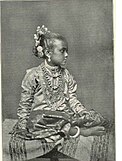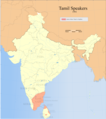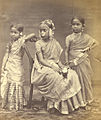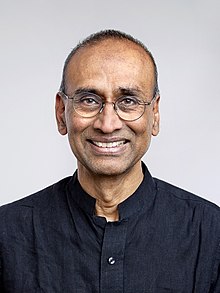Portal:Tamils
The Tamils portal
The Tamil people, also known as Tamilar (Tamil: தமிழர், romanized: Tamiḻar, pronounced [t̪amiɻaɾ] in the singular or தமிழர்கள், Tamiḻarkaḷ, [t̪amiɻaɾɡaɭ] in the plural), Tamilians, or simply Tamils (/ˈtæmɪlz, ˈtɑː-/ TAM-ilz, TAHM-), are an ethnolinguistic group who natively speak the Tamil language and trace their ancestry mainly to India's southern state of Tamil Nadu, to the union territory of Puducherry, and to Sri Lanka. The Tamil language is one of the world's longest-surviving classical languages, with over 2000 years of Tamil literature, including the Sangam poems, which were composed between 300 BCE and 300 CE. People who speak Tamil as their mother tongue and are born in are considered Tamils.
Tamils constitute 5.9% of the population in India (concentrated mainly in Tamil Nadu and Puducherry), 15% in Sri Lanka (excluding Eelam Moors), 7% in Malaysia, and 5% in Singapore. From the 4th century BCE, urbanisation and mercantile activity along the western and eastern coasts of Tamilakam -- what is today Kerala and Tamil Nadu -- led to the development of four large Tamil empires, the Cheras, Cholas, Pandyas, Pallavas, and velirs and a number of smaller states, all of whom were warring amongst themselves for dominance. The Jaffna Kingdom, and vanni chieftaincies inhabited by Eelam Tamils, was once one of the strongest kingdoms of Sri Lanka and controlled much of the north of the island. (Full article...) Selected article -There are literary, archaeological, epigraphic and numismatic sources of ancient Tamil history. The foremost among these sources is the Sangam literature, generally dated to 5th century BCE to 3rd century CE. The poems in Sangam literature contain vivid descriptions of the different aspects of life and society in Tamilakam during this age; scholars agree that, for the most part, these are reliable accounts. Greek and Roman literature, around the dawn of the Christian era, give details of the maritime trade between Tamilakam and the Roman empire, including the names and locations of many ports on both coasts of the Tamil country. There are evidences as could be seen comparing standard forms of Sumerian literature and those recovered through present form of Tamil, for example the word for father in Sumerian transliteration is given as, "a-ia" that could easily be compared with Tamil word, "ayya". This also places ancient form of Tamil to early Sumerian period, say as ancient as 3500 BC. Archaeological excavations of several sites in Tamil Nadu and Kerala have yielded remnants from the Sangam era, such as different kinds of pottery, pottery with inscriptions, imported ceramic ware, industrial objects, brick structures and spinning whorls. Techniques such as stratigraphy and paleography have helped establish the date of these items to the Sangam era. The excavated artifacts have provided evidence for existence of different economic activities mentioned in Sangam literature such as agriculture, weaving, smithy, gem cutting, building construction, pearl fishing and painting. (Full article...)General imagesSelected biography -Venkatraman Ramakrishnan (born 1952) is a British-American structural biologist. He shared the 2009 Nobel Prize in Chemistry with Thomas A. Steitz and Ada Yonath for research on the structure and function of ribosomes. Since 1999, he has worked as a group leader at the Medical Research Council (MRC) Laboratory of Molecular Biology (LMB) on the Cambridge Biomedical Campus, UK and is a Fellow of Trinity College, Cambridge. He served as President of the Royal Society from 2015 to 2020. (Full article...)CategoriesTopicsTamil People Countrywide: India • Sri Lanka • Canada • Malaysia • Singapore • South Africa • England Related Ethnic Groups: Brahui • Gond • Kannadiga • Khonds • Kodava • Oraon • Malayali • Telugus • Tuluvas Related indigenous Groups: Badagas • Toda • Kuruba
See also: List of Tamil people, Tamil script, Tamil Script Code for Information Interchange Related portalsWikiProjectsThings to do
Associated WikimediaThe following Wikimedia Foundation sister projects provide more on this subject:
Discover Wikipedia using portals |































































